The COVID-19 vaccination campaign for children aged 12-17 years old officially launched nationwide from early November 2021.
According to the Ministry of Health , COVID-19 vaccination for children is important, first of all to protect children's health in the context of the complicated developments of the COVID-19 pandemic. At the same time, COVID-19 vaccination for children in this age group contributes to increasing COVID-19 vaccination coverage in the community.
Currently, some COVID-19 vaccines, according to the manufacturer's instructions, have been indicated for vaccination for children aged 12-17. The manufacturer's research results also show that COVID-19 vaccination for children has the same disease prevention effectiveness as in people aged 18 and over. Therefore, many countries around the world have deployed COVID-19 vaccination for children aged 12-17.
In Vietnam, the vaccination campaign for children aged 12-17 years old has been implemented nationwide since November, following a roadmap from high to low age, prioritizing vaccination for the 16-17 age group first and gradually lowering the age according to the progress of vaccine supply and the local epidemic situation. Vaccination against COVID-19 for children is carried out first in localities that have undergone social distancing, have a high rate of COVID-19 infection; localities with high population density, high risk of infection.
In parallel with the Vaccination Campaign for children aged 12-17, the Ministry of Health requires localities to accelerate the progress of the first dose of COVID-19 vaccination; to cover the vaccination for people aged 50 and over to protect them from the risk of severe illness and reduce the risk of death if they unfortunately get sick, according to the direction in Resolution 128/NQ-CP of the Government and Decision 4800/QD-BYT of the Ministry of Health.
The Ministry of Health and the National Expanded Immunization Program call for and hope to receive the support, trust and proactive participation of parents and caregivers, in coordination with the health sector and schools so that their children have the opportunity to be vaccinated against COVID-19 safely and with sufficient doses. Each child aged 12-17 who is vaccinated against COVID-19 safely and with sufficient doses will contribute to creating strong community immunity, together with the whole country adapting safely and flexibly to the new normal conditions.
Submit Question Online Interview
Automatically updated in 11 seconds...
Vu Quoc Khanh [email protected] • 4:8 11/3/2021
Address: Hanoi
As far as I know, children can have a fever after vaccination. So in which cases is fever normal and parents do not need to worry? In which cases should children be taken to the hospital immediately?
 Assoc.Prof.Dr. Tran Minh Dien
Assoc.Prof.Dr. Tran Minh Dien
Vaccine is an antigen, when entering the body, it will encounter the body's immune system and create an immune response, thereby causing symptoms of fever and vasodilation.
Fever is immediately visible and is often accompanied by symptoms such as body aches, chills, etc. In this case, you can give your child pain relievers such as paracetamol.
In case of high fever, above 38.5 degrees Celsius, take antipyretics but poor response within 4-6 hours. In these cases, take the child to the nearest medical facility.
In addition, if the child has a fever and some symptoms such as palpitations and fatigue, the child should be taken to a medical facility immediately. In general, we need to consider whether the child has a single symptom or many accompanying symptoms, so that appropriate treatment can be given. Children should be closely monitored for 3-7 days after vaccination.
Tran Thu Thuy [email protected] • 4:7 11/3/2021
The information that the COVID-19 vaccine can cause infertility makes me very worried about whether or not to vaccinate my child. Experts, please tell me the truth of this information?
 Assoc.Prof.Dr. Tran Minh Dien
Assoc.Prof.Dr. Tran Minh Dien
Regarding the risk of infertility, we all know that the virus has only appeared for 2 years, the vaccine has only been injected for more than a year, and the vaccine for children has only been deployed since the beginning of the summer.
Initial data shows no long-term health or reproductive health effects. These results are similar to the Pfizer vaccine.
Nguyen Hai Dang [email protected] • 4:3 11/3/2021
What side effects can children experience when receiving the COVID-19 vaccine and is the risk of side effects higher than in adults, Associate Professor, Dr. Tran Minh Dien?
 Assoc.Prof.Dr. Tran Minh Dien
Assoc.Prof.Dr. Tran Minh Dien
The country has been vaccinated with a variety of vaccines, including Vero Cell and mRn vaccines. With the Pfizer vaccine, common side effects include pain at the injection site, body aches, chills or fever. Data on more severe reactions such as anaphylaxis has been recorded, but is very limited.
Tuan Anh [email protected] • 4:1 11/3/2021
Which children are contraindicated for COVID-19 vaccination?
 Assoc.Prof.Dr. Tran Minh Dien
Assoc.Prof.Dr. Tran Minh Dien
The only contraindication to the Pfizer vaccine is an anaphylactic reaction to the vaccine itself. During the screening process, it is important to note that vaccination should be postponed if there is an acute or chronic illness that is progressing, such as fever due to other causes; or if nephrotic syndrome is having an acute attack, it should also be postponed.
In other conditions, caution is needed, such as a history of anaphylaxis to any agent, and children with chronic diseases also need to be cautious. Therefore, this group needs to be vaccinated in the hospital.
Underlying diseases are congenital diseases such as congenital heart disease or congenital brain defects, chronic diseases such as liver and kidney disease, including autistic children - this group needs to be careful, should be vaccinated in the hospital so that doctors and nurses can monitor more closely.
Recently, the Ministry of Health has closely directed the coordination between hospitals and preventive medicine so that when a situation occurs, there will be appropriate caretakers.
Minh Thu [email protected] • 3:57 11/3/2021
Is there anything different about COVID-19 vaccination for children compared to adults that not only in Vietnam but also around the world is being very cautious about this issue?
 Assoc.Prof.Dr. Tran Minh Dien
Assoc.Prof.Dr. Tran Minh Dien
For children, when they unfortunately get sick, the symptoms will be milder than adults. However, children still need to be vaccinated, especially children under 18 years old and children with underlying diseases.
The World Health Organization also recommends vaccination for children under 18 years of age and children with underlying medical conditions.
When you vaccinate your children, it will help them reduce the risk of getting sick and, more importantly, not becoming a source of infection for family members. Therefore, you should vaccinate your children against COVID-19.
As for the differences compared to vaccination in adults, for children under 18 years old, parental consent is required.
Regarding screening, there are some specific features that the Ministry of Health has released for screening with vaccines for children. Another problem is that after vaccination, children are still not aware and their self-identification of symptoms is not complete, so family supervision for the first 3-5 days is very important.
Quoc Huy [email protected] • 3:41 11/3/2021
Address: Ha Nam
Research and licensing for COVID-19 vaccination in children is being carried out very urgently. Is there enough confidence in the safety of the vaccine, doctor?
 Assoc.Prof.Dr. Tran Minh Dien
Assoc.Prof.Dr. Tran Minh Dien
Vaccines that have been created and licensed have gone through many stages to be able to be released on the market from the research stages, specifically regarding safety based on strict procedures. Therefore, the vaccine must be considered safe, ensure immunogenicity and see the success rate of disease resistance.
At the time the virus appeared in late 2019, we did not have much time to research. After nearly 2 years, the vaccine's immunity has had a certain effect. Currently, the whole world is waiting for the vaccine to spread worldwide, hoping that we will be able to fight the epidemic.
Ngoc Hang [email protected] • 3:37 November 3, 2021
What are the world studies on the protective efficacy and safety of Pfizer vaccine for children?
 Assoc.Prof.Dr. Tran Minh Dien
Assoc.Prof.Dr. Tran Minh Dien
Many countries in the world have prescribed Pfizer for children, especially studies in the US, all show that the vaccine is safe and has good immunogenicity for children. If they get sick, the mortality rate is reduced, especially for children with underlying diseases, the statistics are very meaningful.
Vaccines that are put on the market have gone through extensive research. The government and the Ministry of Health are distributing vaccines to provinces and cities. This is also the most desirable thing for children.
Source: https://suckhoedoisong.vn/chuyen-gia-giai-dap-ve-tiem-vaccine-phong-covid-19-cho-tre-em-169211103103218849.htm


![[Photo] Panorama of the Opening Ceremony of the 43rd Nhan Dan Newspaper National Table Tennis Championship](https://vphoto.vietnam.vn/thumb/1200x675/vietnam/resource/IMAGE/2025/5/19/5e22950340b941309280448198bcf1d9)


![[Photo] General Secretary To Lam attends the conference to review 10 years of implementing Directive No. 05 of the Politburo and evaluate the results of implementing Regulation No. 09 of the Central Public Security Party Committee.](https://vphoto.vietnam.vn/thumb/1200x675/vietnam/resource/IMAGE/2025/5/19/2f44458c655a4403acd7929dbbfa5039)
![[Photo] President Luong Cuong presents the 40-year Party membership badge to Chief of the Office of the President Le Khanh Hai](https://vphoto.vietnam.vn/thumb/1200x675/vietnam/resource/IMAGE/2025/5/19/a22bc55dd7bf4a2ab7e3958d32282c15)
![[Photo] Close-up of Tang Long Bridge, Thu Duc City after repairing rutting](https://vphoto.vietnam.vn/thumb/1200x675/vietnam/resource/IMAGE/2025/5/19/086736d9d11f43198f5bd8d78df9bd41)
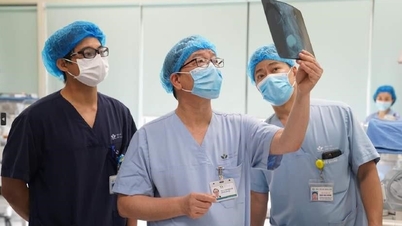




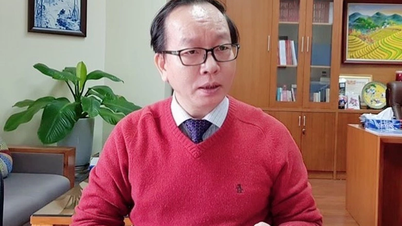
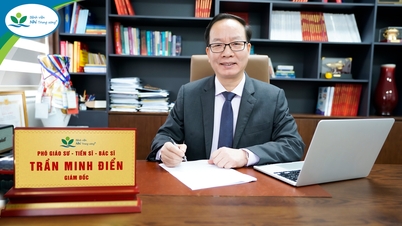






















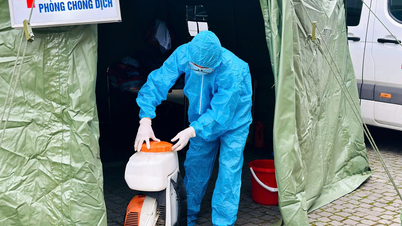

![[Photo] Prime Minister Pham Minh Chinh inspects the progress of the National Exhibition and Fair Center project](https://vphoto.vietnam.vn/thumb/1200x675/vietnam/resource/IMAGE/2025/5/19/35189ac8807140d897ad2b7d2583fbae)




































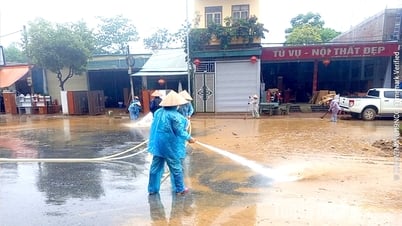

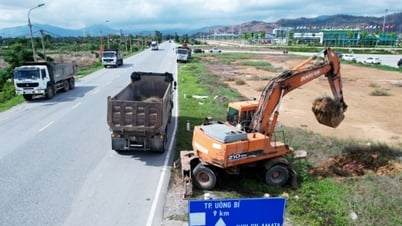

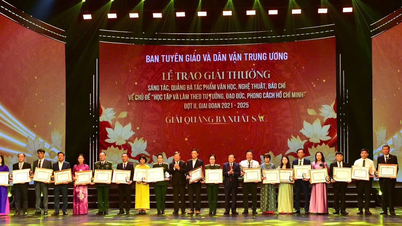







![[VIDEO] - Enhancing the value of Quang Nam OCOP products through trade connections](https://vphoto.vietnam.vn/thumb/402x226/vietnam/resource/IMAGE/2025/5/17/5be5b5fff1f14914986fad159097a677)



Comment (0)